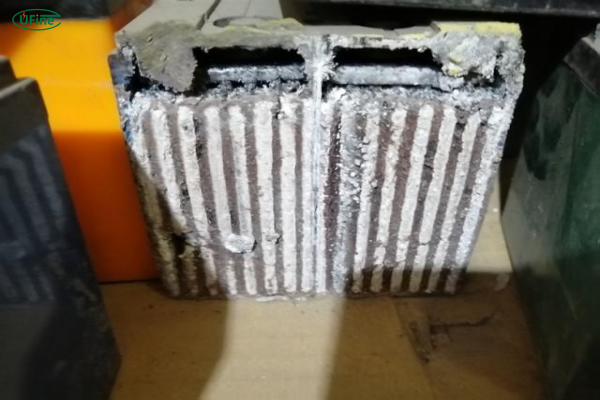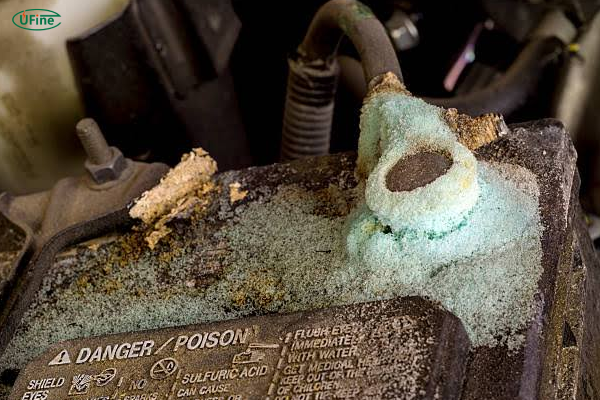
- Part 1. How does battery sulfation occur?
- Part 2. Signs of battery sulfation
- Part 3. Hazards of battery sulfation
- Part 4. What causes battery sulfation?
- Part 5. How to deal with sulfated batteries?
- Part 6. Can battery sulfation continue to be used?
- Part 7. Can I fix a sulfated battery?
- Part 8. How to prevent battery sulfation?
- Part 9. FAQs
Battery sulfation is a condition that affects lead-acid batteries, causing a reduction in their performance and lifespan. It happens when lead sulfate crystals build up on the battery’s plates, leading to a decrease in its ability to charge and discharge effectively. If left unchecked, sulfation can render a battery useless. So, it’s crucial to understand how it happens, how to recognize the signs, and how to prevent it.
Part 1. How does battery sulfation occur?
Battery sulfation happens over time due to the chemical reactions that occur within a lead-acid battery. When a battery is charged or discharged, lead sulfate forms on the battery’s plates as part of the normal process. However, if the battery is left undercharged for long periods, or if it’s allowed to sit idle, these lead sulfate crystals harden and bond to the plates.
This hardening makes it difficult for the battery to return to its fully charged state, significantly reducing its ability to store energy and deliver power. The process of sulfation starts slowly but becomes more severe over time, especially if the battery is not properly maintained.
Part 2. Signs of battery sulfation
Knowing the signs of battery sulfation can help you detect the problem early, before it causes permanent damage to your battery. Some common symptoms of sulfated batteries include:
- Slow Cranking or Failure to Start: A sulfated battery may struggle to start a vehicle or other equipment because it cannot provide sufficient power.
- Reduced Battery Life: Sulfation can cause the battery to wear out much faster than a healthy battery.
- Low Voltage: When tested, a sulfated battery will show a lower voltage than expected, even when fully charged.
- Battery Discharge Issues: The battery may lose its charge more quickly than usual or fail to recharge properly.
- Swelling or Leakage: In severe cases, sulfation can cause the battery to swell or leak, which is a sign of internal damage.
If you notice any of these symptoms, it’s important to address the issue as soon as possible to prevent further damage to your battery.
Part 3. Hazards of battery sulfation
Battery sulfation isn’t just a minor inconvenience—if left unchecked, it can lead to serious problems:
- Permanent Damage: Once sulfation takes hold, it can permanently damage the battery’s internal components, making it impossible to restore.
- Reduced Capacity: Even if a sulfated battery seems to work, it will have reduced capacity. This means it won’t be able to hold a charge or provide power effectively.
- Overheating: Sulfated batteries can overheat during use, posing safety risks like potential battery leaks or ruptures.
- Increased Maintenance Costs: Dealing with sulfation may require frequent battery replacements or more costly repairs, especially in high-demand systems like vehicles or backup power systems.
Part 4. What causes battery sulfation?
Sulfation can occur for a variety of reasons, often tied to improper battery usage or neglect. Here are the most common causes:
- Prolonged Undercharging: If a battery is not fully charged on a regular basis, lead sulfate crystals can form on the plates. This is often seen in vehicles that aren’t used frequently or in standby systems that aren’t properly maintained.
- Extended Discharge: Allowing the battery to discharge completely and not recharging it promptly can also lead to sulfation.
- Low-Quality Batteries: Low-quality or poorly manufactured batteries may be more prone to sulfation.
- Extreme Temperatures: Exposure to extreme heat or cold can accelerate sulfation. High temperatures can cause the battery to discharge more quickly, leading to crystallization, while cold temperatures can reduce the battery’s ability to charge properly.
- Old Age: Over time, all batteries experience some degree of sulfation as part of the natural aging process. Older batteries are more vulnerable to developing sulfation.
Part 5. How to deal with sulfated batteries?
If you suspect your battery is sulfated, there are a few methods you can use to deal with it. Here’s what you can try:
- Desulfation Process: Some battery chargers come with a desulfation mode. These chargers work by sending a special pulse of current through the battery to break up the lead sulfate crystals. While this can help restore a battery to some extent, it may not fully fix the issue if the sulfation is severe.
- Battery Replacement: If desulfation doesn’t work, or if the sulfation is too far gone, replacing the battery is the only option.
Part 6. Can battery sulfation continue to be used?
A sulfated battery can still work to a degree, but its performance will be compromised. Reduced capacity means that the battery won’t last as long as it should, and it may not be able to power devices as effectively.
In some cases, a sulfated battery can still be useful for low-power applications, but for critical systems (like a car or backup power supply), it’s risky to rely on a battery that may fail unexpectedly. It’s always best to replace the battery if sulfation is detected.
Part 7. Can I fix a sulfated battery?
While it’s possible to fix a sulfated battery to some extent, full restoration is difficult. There are methods like desulfation chargers or manual desulfation techniques, but these solutions may only work if the sulfation isn’t too severe.
- Desulfation Chargers: These are designed to reverse the sulfation process by sending high-frequency pulses of electricity through the battery. However, this may not work if the sulfation has advanced too far.
- Manual Desulfation: For small batteries, some users have tried using specific chemicals to break down the sulfation. However, this method is not recommended without professional knowledge, as it can be dangerous.
Ultimately, once sulfation becomes severe, the battery may be beyond repair and will need to be replaced.
Part 8. How to prevent battery sulfation?
Prevention is always the best option when it comes to sulfation. Here are a few steps you can take to prevent your battery from sulfating:
- Keep Batteries Charged: Regularly charge your batteries, especially if they are used infrequently. This ensures that they don’t stay in a partially charged state, which is a common cause of sulfation.
- Avoid Over-Discharge: Don’t let your battery discharge completely, and always recharge it as soon as possible.
- Use the Right Charger: Always use a charger that is designed for your specific battery. Overcharging or undercharging can both cause sulfation.
- Store Properly: If you’re storing a battery for long periods, store it in a cool, dry place. Avoid leaving batteries in hot environments, such as in a car during the summer.
- Regular Maintenance: If the battery is used in a vehicle or backup system, perform regular maintenance checks to ensure it’s operating optimally.
By following these practices, you can significantly reduce the risk of sulfation and prolong the life of your batteries.
Part 9. FAQs
-
How do I know if my battery is sulfated?
Signs of sulfation include slow cranking in vehicles, reduced battery life, and lower voltage readings. You may also notice that the battery no longer holds a charge as effectively. -
Can sulfated batteries be revived?
In some cases, sulfated batteries can be revived using a desulfation charger or special techniques, but it may not be possible to fully restore them if the sulfation is severe. -
How long does it take for a battery to sulfate?
Sulfation is a gradual process and can develop over several months or years, especially if the battery is not maintained properly. Batteries that are left undercharged or unused for extended periods are more likely to sulfate. -
How can I prevent sulfation in my battery?
To prevent sulfation, make sure to regularly charge your battery, avoid over-discharging, and store it properly in a cool, dry place. Use the correct charger and follow maintenance guidelines. -
What is the lifespan of a sulfated battery?
Once sulfation has significantly reduced a battery’s capacity, its lifespan is usually shortened. The battery may still function, but not efficiently, and will need to be replaced sooner than a healthy battery.
Related Tags:
More Articles

What are Watts and Watt Hours in Battery?
Understand watt vs watt-hour in batteries, how to calculate battery watt hours, and what Wh means for car batteries, devices, and energy storage.
A Complete Guide to the Best Batteries for Flashlights
Compare the best batteries for flashlights, including AA, AAA, 18650, 21700, CR123A. See which battery offers the best brightness, runtime, and reliability.
How Long Do Rechargeable AA Batteries Last?
How long do rechargeable AA batteries last? Compare NiMH and lithium AA lifespan, recharge cycles, key factors, and performance vs alkaline batteries.
How Much Current Can a 9V Battery Really Supply?
Discover how many amps a 9V battery can supply, its actual current output, discharge rate, and capacity for alkaline, lithium, and rechargeable 9V batteries.
12V STD vs 12V AGM: Meaning, Differences, and Which Is Better
Understand what STD and AGM batteries mean, their key differences, and which 12V battery fits your needs best in 2026.




